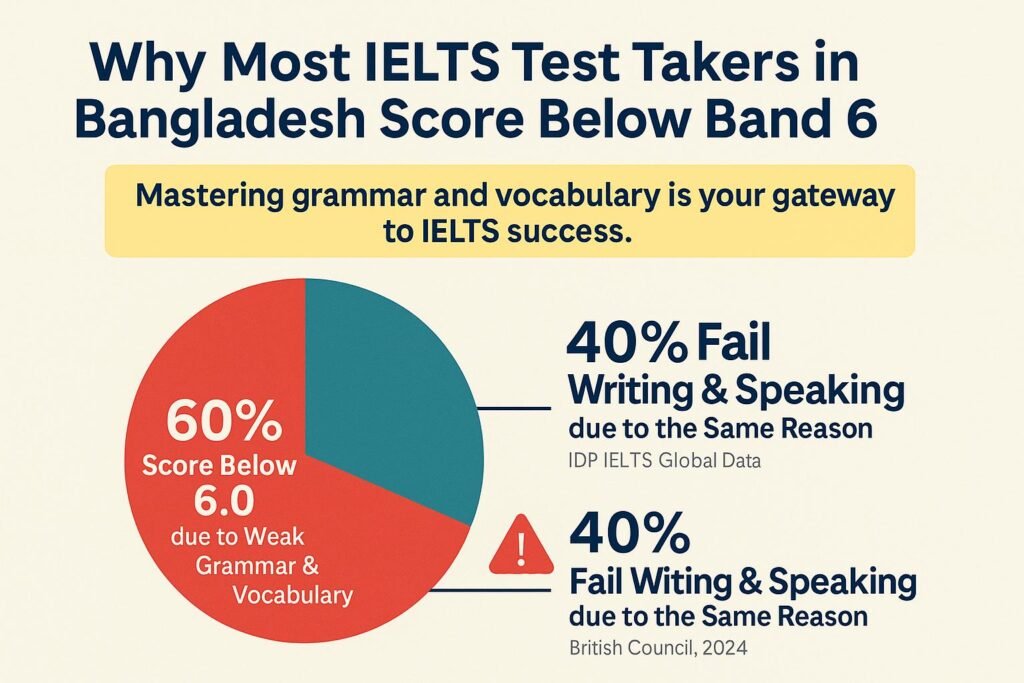The two main foundations of English language proficiency are grammar and vocabulary. However, many IELTS test takers in Bangladesh fail to achieve the desired score because they are behind in these two areas.

Let’s look at the statistics:
- According to a 2024 report by the British Council, about 60% of IELTS test takers in Bangladesh score below band 6.0 due to weaknesses in grammar and vocabulary.
- IDP IELTS global data shows that 40% of students do not achieve a passing mark in the Writing and Speaking modules due to insufficient grammar and vocabulary alone.
Today’s discussion concerns effective strategies for strengthening grammar and vocabulary to overcome these problems.
IELTS Grammar & Vocabulary Scoring

| Exam sections | grading area | % of total marks | Tips to Increase Score |
| Writing | Grammar | 25% | Use at least 3 Complex Sentences (e.g. Relative Clause, Conditional)Correct Tense, Subject-Verb Agreement mistakes. |
| Vocabulary | 25% | Use 2-3 academic words in each paragraph (e.g. “significant” instead of “big”)Learn collocations (e.g. “heavy rain”, NOT “heavy rain”) | |
| Speaking | Grammar | 25% | Reduce Self-CorrectionUse Mixed Tenses (Present Perfect + Past Simple) |
| Vocabulary | 25% | Use Idioms (e.g. “it’s not my cup of tea”) Use Phrasal Verbs (e.g. “come up with”) | |
| Reading | Grammar | 25% | Learn Prefix/Suffix (eg: “unhappiness” = “un-” + “happy” + “-ness”)Know synonyms (e.g. “rich” = “wealthy”) |
| Listening | Vocabulary | 25% | Recognize homophones (e.g. “here” vs “hear”)Learn the difference between British/American Accent |
Tips for improving grammar and vocabulary
Below are some effective step-by-step tips to strengthen grammar and vocabulary to score well in IELTS:
1. Watching movies/series (with English subtitles):
Watching English movies or series can help you learn real-life conversations, pronunciation, accent (British/American), and natural vocabulary. The language is more natural and practical than book language, which helps with IELTS speaking and listening.
How do you see?
- Turn subtitles ON (English first, then turn them off and take the challenge).
- Note down unknown words, find their meaning, and make sentences.
- Repeat—try to understand the same scene by listening to it repeatedly.
What will you see?
- British English: The Crown, Peaky Blinders, Sherlock
- American English: Friends, The Social Network, TED Talks
- Documentaries: Planet Earth (BBC), The Great Hack (Netflix)
2. Reading newspapers or magazines:
Reading newspapers or magazines is one of the most effective methods for IELTS, as it develops three skills at once:
- Vocabulary Buildup –Increase vocabulary appropriate for learning Academic and Formal Vocabulary.
- Grammar Structure – Learn correct sentence structure, tense, article and preposition usage.
- Current Affairs –Current Affairs helps in preparing examples for IELTS Writing (Task 2) and Speaking beautifully.
Which newspaper/magazine do you read?
| Resource | Language typeF | Why read? |
| The Guardian | British English | Ideal, balanced language for IELTS |
| BBC News | British English | Audio + Text (Listening Practice) |
| The New York Times | American English | To learn writing style |
| The Economist | Advanced English | High-level vocabulary and analysis |
| National Geographic | Academic/Scientific | IELTS Writing (Environment/Science Topics) |
3.Listening to podcasts/radio:
Listening to podcasts or radio is a powerful tool for IELTS listening, speaking and vocabulary because it:
- Provides exposure to natural English (speed, pronunciation, intonation).
- Allows to recognise different accents (British, American, Australian).
- Passive learning is possible – you can listen while exercising, travelling, or cooking.
What will you hear?
1. BBC 6 Minute English
- Level: Beginner to Intermediate
2. IELTS Energy Podcast
- Level: IELTS-Specific (Intermediate to Advanced)
3. TED Talks Daily
- Level: Intermediate to Advanced
4. Spelling Vocabulary Notebook:
50% of your success in increasing your band score in IELTS depends on a strong vocabulary. A properly created vocabulary notebook will help you:
- To understand the deeper meaning of words (not just Bangla translation).
- To learn synonyms, which increases scores in IELTS Writing and Speaking.
- To retain words in long-term memory (Spaced Repetition Technique).
5.Grammar Practice for IELTS:
Grammar is the foundation of English, and it is important in all modules of IELTS (Writing, Speaking, Listening, Reading).
1. Grammarly (mistake checker tool)
Why use?
- Detects spelling, grammar, and punctuation errors in real-time.
- Particularly useful for IELTS Writing Tasks 1 and 2.
2. Cambridge English Grammar in Use (Book)
Why is it the best?
- IELTS-friendly grammar rules are explained with simple examples.
- 3 levels: Basic (red), Intermediate (blue), Advanced (green).
3. British Council LearnEnglish (Free Online Exercises)
Why use?
- IELTS-specific grammar exercises (Tenses, Articles, Prepositions).
- Learn through interactive quizzes and games.
6. Writing and Speaking Practice:
- Write: Write a paragraph or essay every day and check it with Grammarly.
- Speaking Partner: Speak with native speakers on HelloTalk or Tandem.
Books for IELTS Grammar and Vocabulary
Both grammar and vocabulary are very important for achieving a high score in the IELTS exam.You can strengthen these two skills by selecting the right books and practicing regularly.Below is a list of some trusted books to improve grammar and vocabulary for the IELTS exam.
For Grammar:
- “Cambridge Grammar for IELTS”—This book from Cambridge University Press is specifically designed for IELTS. It teaches grammar with examples from real tests.
- “English Grammar in Use”—Raymond Murphy’s book is recognized worldwide and suitable for students of all levels, from beginner to advanced.
- “Oxford Practice Grammar Advanced” – This book by George Yule is good for checking advanced grammar for IELTS.
- “Oxford Practice Grammar Advanced” – This book by George Yule is good for checking advanced grammar for IELTS.
For Vocabulary:
- “Cambridge Vocabulary for IELTS” – This book by Pauline Cullen is the best for learning IELTS-specific vocabulary.
- “IELTS Band 9 Vocab Secrets” – This book, created by Cambridge IELTS consultants, covers advanced vocabulary for a Band 9 score.
- “Oxford Word Skills (Advanced)”—Ruth Geirons and Stuart Redman’s book helps readers understand advanced-level vocabulary.
- “Barron’s Essential Words for the IELTS” – This guide by Dr. Lynn Lougheed discusses the essential words for the IELTS in detail.
In addition to books, you can download free materials from the official websites of the British Council, IDP, and Cambridge English. Also, the blogs of IELTS Liz (Liz-ielts.com) and IELTS Simon (ielts-simon.com) are beneficial.
Conclusion
Improving grammar and vocabulary is a continuous process—you can’t become perfect in one day.But with regular practice, patience, and the right resources, you will definitely succeed!Remember, “Practice makes progress.”
